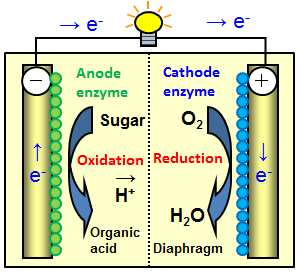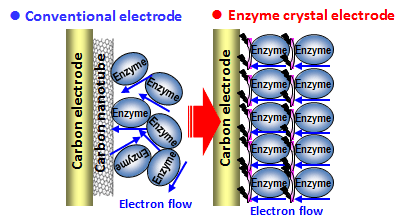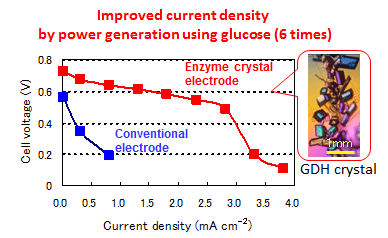Sep. 1, 2013
Enzyme crystal immobilized electrode, and sensor and battery equipped with the electrode
RIKEN No.: 07801
Inventors
Tsutomu Mikawa (RIKEN Cellular & Molecular Biology Unit), Yasushi Shigemori and Yuichiro Nakaoki (Aisin Cosmos R&D Co., Ltd.)
Background
Biofuel cells that couple the substrate-specific catalytic reaction of enzymes with electrode reactions have drawn attention as a safe and clean source of electricity with low environmental costs. These cells generate electricity using various types of biomass such as saccharides as fuel, and generate electricity under normal temperature and pressure.
To realize practical applications of biofuel cells, it is necessary to develop an enzyme electrode capable of maximizing catalytic functions of the enzyme. However, there are a number of obstacles to the use of conventional technologies, including their failure to deliver current value equivalent to the quantity of enzyme linked due to instability of enzymes on the electrode, as well as limitations in the types of enzymes that can be applied, and inability to increase the concentration when enzyme is immobilized on the electrode surface.
Summery
The researchers discovered that enzyme can be immobilized with high density and a uniform orientation by immobilizing the enzyme crystals on the electrode surface, and that it can be used to construct an electrode with higher current response than conventional technologies as catalytic functions are smoothly delivered.
Since this enzyme electrode delivers a better electrode performance than the conventional enzyme electrodes, it can be applied in various industrial fields such as medicine, food and environment, in addition to biofuel cells and biosensors. Expected applications include power supply in devices with low power consumption levels (cell phones, etc.) and devices that are implanted in human bodies.

Fig. 1: Schematic diagram of a bio-cell

Fig. 2: Schematic diagram of crystallized enzyme electrode

Fig. 3: Biofuel cell using crystallized enzyme electrode
Merits
- Provides enzyme electrodes with higher performance, capable of delivering higher output from biofuel cells than conventional technologies.
Applications
- Biofuel cells and biosensors (battery application examples: batteries in small electronic devices, emergency power supplies)
Reference
- 1.PCT/JP2011/069060
